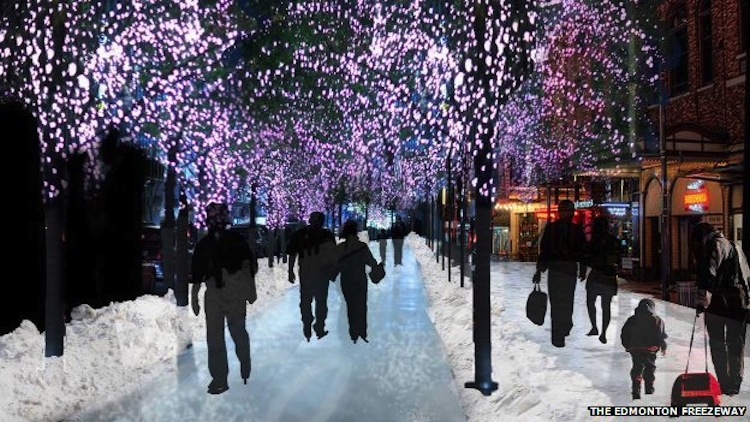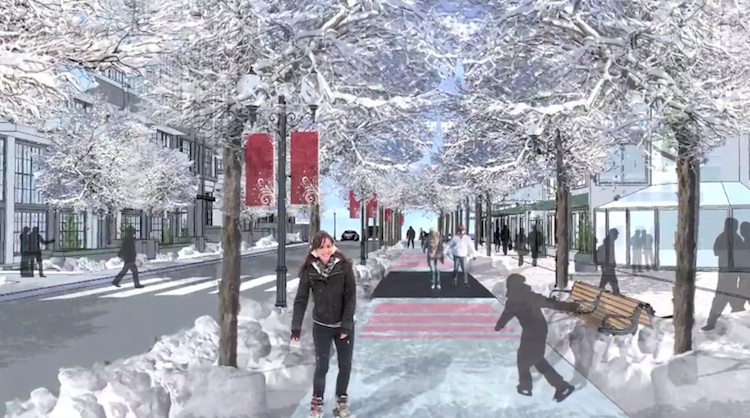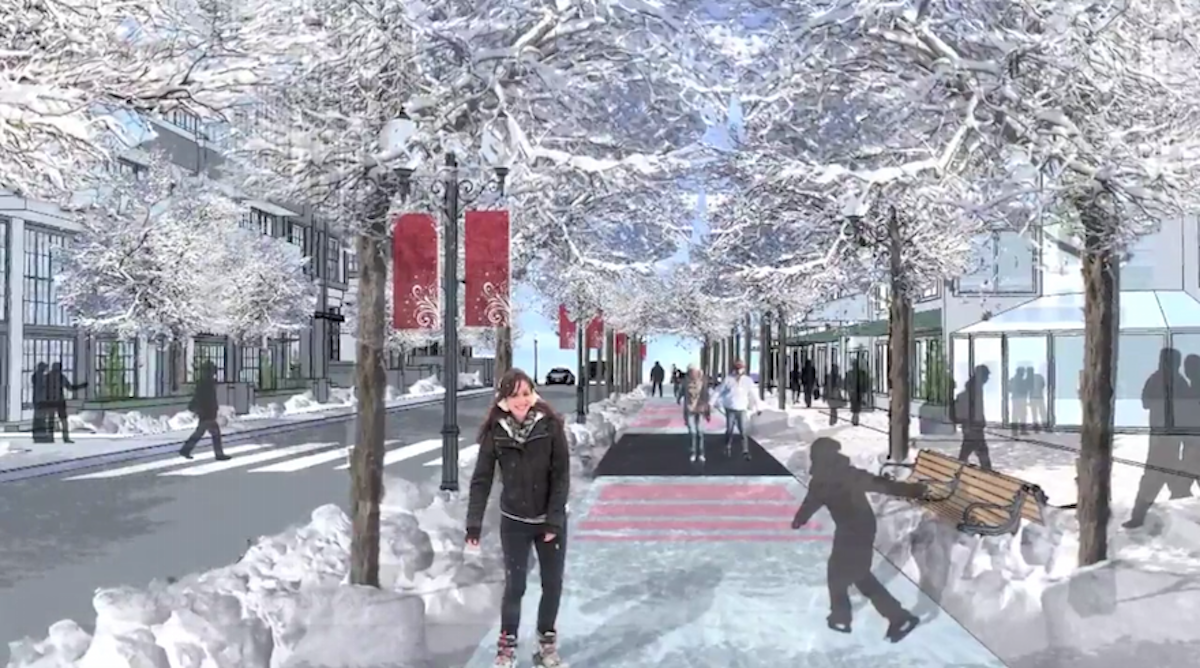When cities such as Edmonton, Canada, are below freezing for the majority of the year, it's hard to want to embrace the cold and snow. However, landscape architecture student Matthew Gibbs and city council members are considering a way to encourage residents to enjoy the cold rather than try to hide from it. According to BBC, the city is pondering the idea of a "Freezeway" and may launch a pilot project as early as next winter.
The idea was first brought up during a city council meeting during the 1990s, when a council member made an off-hand comment that suggested opening the fire hydrants and letting the streets flood and freeeze over. The comment inspired Gibbs to design the Freezeway, which won first place at the 2013 COLDSCAPES international design competition.
Gibbs said that if two existing rail corridors were connected, then an 11-km route could be established to allow people to skate to work, school, or events in the city. The Freezeway would also encourage more active lifestyles during the winter months, said Gibbs.
Design plans for the Freezeway include:
- Setting up skate rentals in nearby metro stops
- Using buildings as windbreaks
- Using "curbside skating lanes" that could be rolled up in the spring
- Providing built-in snow storage to serve as traffic dividers and contain the ice
- Building developments and plazas in sunny areas
Many council members have said the Freezeway is a good idea, and could be financed with corporate sponsorship or crowdsourcing. The price tag would be hefty, however, at as much as $400 per meter.



Related Stories
| Aug 11, 2010
Kansas City Music Hall and Municipal Auditorium
Kansas City, Mo.
The show will go on in Kansas City’s beloved Music Hall and Municipal Auditorium thanks to a fast-track renovation and expansion project that brought the 72-year-old Art Deco playhouse up to 21st-century standards.
| Aug 11, 2010
10 tips for mitigating influenza in buildings
Adopting simple, common-sense measures and proper maintenance protocols can help mitigate the spread of influenza in buildings. In addition, there are system upgrades that can be performed to further mitigate risks. Trane Commercial Systems offers 10 tips to consider during the cold and flu season.
| Aug 11, 2010
Jacobs, HOK top BD+C's ranking of the 75 largest state/local government design firms
A ranking of the Top 75 State/Local Government Design Firms based on Building Design+Construction's 2009 Giants 300 survey. For more Giants 300 rankings, visit http://www.BDCnetwork.com/Giants
| Aug 11, 2010
Harvard Public Library
Harvard, Mass.
Five years ago, the town of Harvard, Mass., which lies about 30 miles west of Boston, faced two problems. First, its iconic public schoolhouse, known as Old Bromfield, which was built in 1877, had become outdated. So, too, had its public library, which had no room to grow on its site.
| Aug 11, 2010
Gilbane, Whiting-Turner among nation's largest university contractors, according to BD+C's Giants 300 report
A ranking of the Top 50 University Contractors based on Building Design+Construction's 2009 Giants 300 survey. For more Giants 300 rankings, visit /giants
| Aug 11, 2010
Rafael Vinoly-designed East Wing opens at Cleveland Museum of Art
Rafael Vinoly Architects has designed the new East Wing at the Cleveland Museum of Art (CMA), Ohio, which opened to the public on June 27, 2009. Its completion marks the opening of the first of three planned wings.
| Aug 11, 2010
World-Class Revival on Utah’s Capitol Hill
Since 1916, the Utah State Capitol building has served as the foundation of Utah’s government, housing the state legislature operations as well as the offices of the governor, attorney general, and treasurer. But after decades of wear and tear and numerous short-sighted modernization attempts, Utah’s rock was on the verge of crumbling.
| Aug 11, 2010
IFMA announces new Religious Facilities Community of practice
The International Facility Management Association is pleased to announce the formation of the Religious Facilities Community, a new community of practice devoted to those who work as full-time, part-time or volunteer facility managers in their houses of worship. IFMA’s communities of practice are organized special interest groups that unite members of specific industries not represented by the association’s councils.







